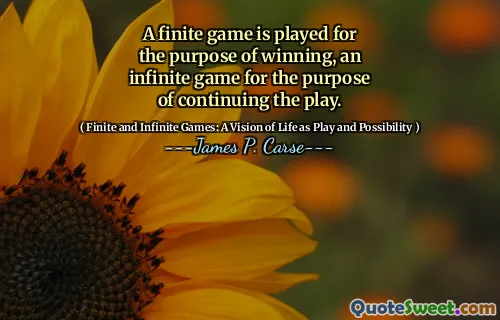"Finite and Infinite Games" by James P. Carse presents a philosophical exploration of the different approaches individuals take toward life and social interactions. Carse introduces the concept of finite games, which are structured with specific rules, clear outcomes of winning or losing, and a defined endpoint. Players engage in these games to achieve victory, often focusing on competition and achievement within established boundaries.
In contrast, infinite games are characterized by their open-ended nature, where the primary goal is not to win but to keep playing and evolving. Participants in infinite games are more concerned with the expansion of possibilities and fostering creativity, collaboration, and long-term relationships. This perspective encourages players to embrace change, adapt, and seek out new opportunities rather than fixating on a single outcome.
The book ultimately invites readers to reflect on their own motivations and the consequences of their choices in life. By understanding the distinction between finite and infinite games, individuals can choose to engage in practices that promote growth, meaning, and interconnectedness, fostering a sense of purpose beyond mere competition. Carse’s insights challenge traditional views of success and encourage a more enriching, playful approach to existence.
More »
Today Birthdays
1955 -
Max Lucado
1946 -
John Piper
1842 -
William James
1907 -
Abraham Joshua Heschel
1887 -
Aldo Leopold
1755 -
Alexander Hamilton
1976 -
Alethea Kontis
1971 -
Mary J. Blige
1825 -
Bayard Taylor
1943 -
Jim Hightower
1885 -
Alice Paul
1923 -
Carroll Shelby
1928 -
David L. Wolper
1954 -
Kailash Satyarthi
1972 -
Amanda Peet
1946 -
Naomi Judd
1970 -
Malcolm D. Lee
1955 -
Christian Marclay
1973 -
Rahul Dravid
1987 -
Jamie Vardy
1942 -
Clarence Clemons
1992 -
Fatima Sana Shaikh
1948 -
Larry Harvey
1930 -
Rod Taylor
